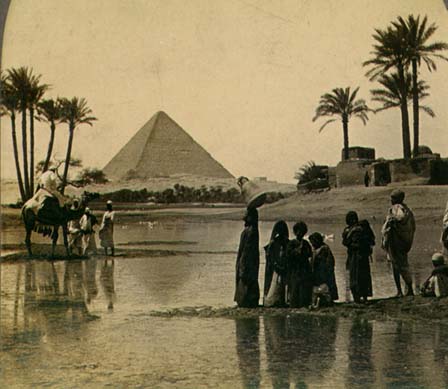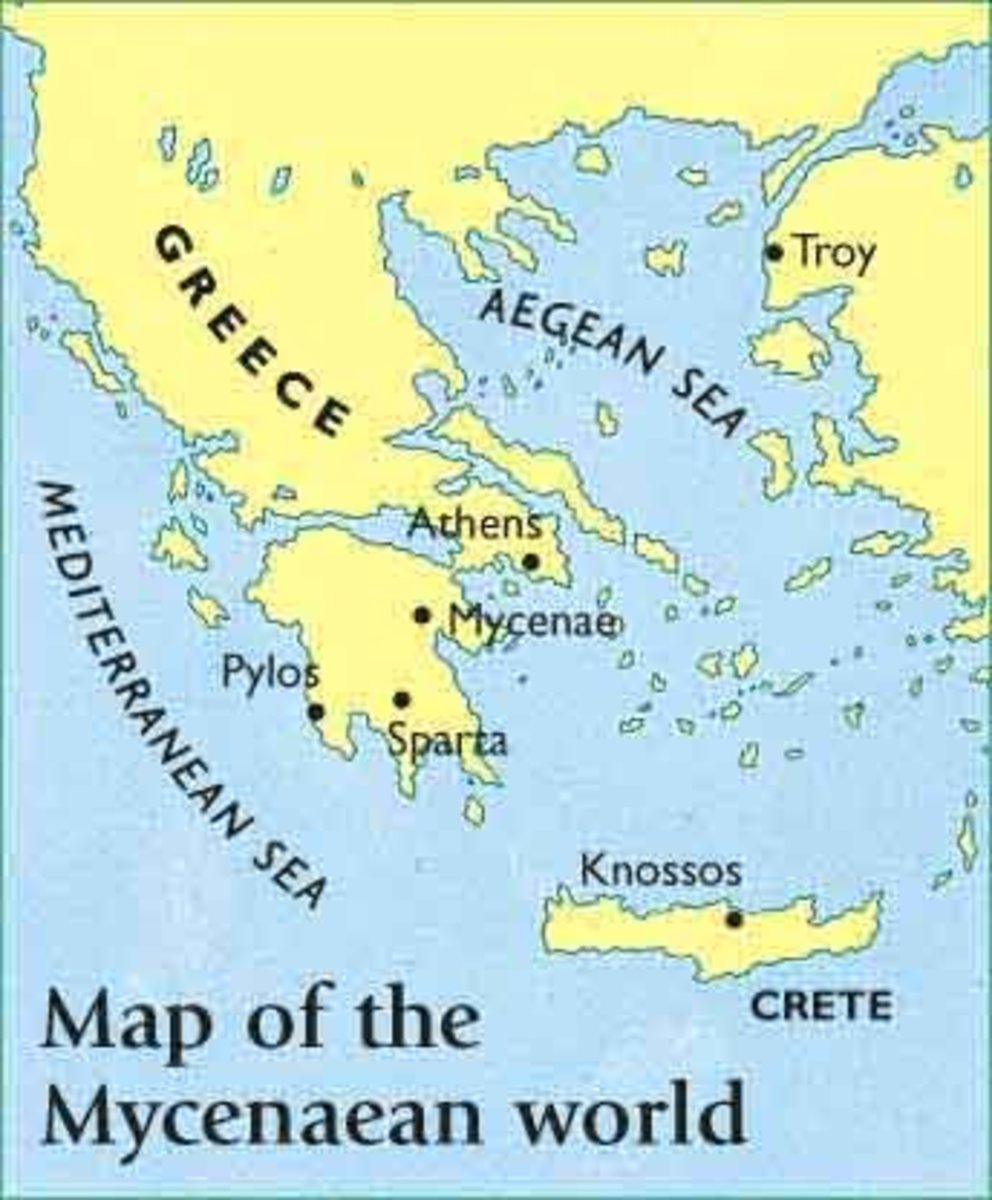Theatre of Hades - the Spectre of Atlantis
The Nation of Atlantis

An Introduction to the HADES theatre
Twelve Prophets Series Episode
1 2 3
The Spectre of Atlantis
The office of Dr. Greek lay deathly still as he pushed his chair away from the student exams he’d been grading. The students first attempts at learning his beloved ancient Greek had grown tedious over the years, and was only serving as an excuse not to open a piece of mail left on his desk by his student assistant.
It was no doubt an invitation to speak on some educational program about the subject of Atlantis. His response would be completely predictable: Atlantis was a literary creation of Plato, a man more interested in illustrating philosophy than recording history. He already had passages marked in his copy of Plato’s partly Critias to illustrate. It would be nothing new.
The most depressing part, beyond just how much he’d be paid for this garbage, was that the producers of the show themselves already knew what he’d say. He would be the anti-Atlantis guy to serve as the counterpoint to Edgar Cayce, Madame Blovatsky, and any other self-proclaimed channeler of the Lost Continent.
Being TV’s anti-Atlantis guy certainly wasn’t what he was pursuing when he took up getting a doctorate in the classics. But it paid well, and with any luck he’d save enough money for a real trip to Greece, the kind that had fired him up like the semester in Greece had as an undergrad.
He left to get a soda from the machine downstairs and only then understood how late it was. He planned to return for the materials for his 7:30 class, but when he arrived, he found an old text vacuum sealed and practically disintegrating. He’d never seen it before. It certainly wasn’t in the university’s special collections, and it was ancient. Dr. Greek dimmed the lights as a precaution. Not having a clue what this thing was he didn’t want to jeopardize its quality by too bright a light. The Greek proved most difficult to read. It wasn’t the Athenian Greek he could read as clear as English. It was older, old enough to give him problems, especially when it was in tatters. So he went about writing a translation in English. It seemed to be titled: “The Story Passed Down the Aegean Line.”
“The.. Aegean Line?”
He was well versed in classical scholarship and never heard of an Aegean line. But right there in the document were the terms for the Aegean sea and for lineage. The thought crossed his mind it was a forgery. But he didn’t have command of the technical detail he’d need to prove it. So he kept up with the translation.
This is the story last passed down to Solon, the Athenian statesman.
“Solon!” Dr Greek exclaimed. This was the man who supposedly passed down the story of Atlantis from Egypt.
Long ago lived a country of men who thought they had conquered the sea. They had made an entire island to float, like any sea vessel. Possessing knowledge of building beyond measure, their island engulfed the sea. So large had their land become that Poseidon felt cheated of his kingdom. But having conquered the sea, they dreamed of conquering the heavens.
Poseidon schemed to gain back the sea, so he promised Apollo a sea nymph of beauty beyond imagining if he’d send an oracle to tell the Atlanteans they could reach the stars. Apollo knew this to be the case, so he agreed, and the Atlanteans built buildings high as mountains. For a short time Poseidon let the Atlanteans taste the ecstasy of the heavens, then he sent a wave which, because Atlantis was possessed of such great height but no base, that it fell like a boat, capsized and riddled with holes.
Poseidon swallowed the kingdom in his own depths so well that the land would never be found. But as a warning he left twelve of these ancients to ensure Atlantis would never be imitated. But Solon, the statesman, refused to hear it, even though it was his lineage. So the story ends here.
Dr. Greek looked up and discovered it was 2 in the morning and he had a 7:30 class. But he couldn’t sleep with such an oddity in his office. So he scoured the books in his office that contained primary documents. He wanted, like any classics scholar, to put this new information into context. He’d pull an all-nighter if he could, but just to be sure he set the alarm on his cell phone to wake him at 7:15. He thought to start at least with Critias, the extant source of confusion.
He awoke at 7:15 not remembering where he’d stopped. The copy of Plato’s dialogue remained in his lap, and the translation lay on his desk unaltered. But the text was gone.
Dr. Greek began speaking to himself in a delirium brought about by lack of sleep and his need to understand the document given to him, “Athens was a naval power. If Atlantis had sunk then… But how would they know to settle in Athens, which had yet to show any signs of economic vitality at the time period of Solon?”
Dr. Greek sat down and poured himself a cocktail of white wine and pomegranate juice. Solon was considered by many as something of the beginning of history. Authors writing long after his death attributed many things to him, and fragments and allusions were all that remained of his life. On some level he represented the beginning of history.
“Is that it?” Dr. Greek began again. “The beginning of history punctuated by the prehistoric arrogance of a previous civilization? Civilization’s lost precautionary tale—the arrogance of nations—forgotten just at the moment it needed to be passed down, the warning of all that civilization was capable of?”
Dr. Greek, after sputtering his disbelief laid his head down in an uncomfortable position as if physical discomfort what some how awaken him, though from what he was not sure. Having not slept in twenty eight hours, he fell asleep in with his back bent and head splayed against the desk.
The Egyptian Monoliths

Dr. Greek awoke with vague memories of going to some kind of occult conference and waking in a startle as his dream ended in his drowning. It was one of those dreams you are conscious of discussing some of great import that you frustratingly forget upon waking up.
Dr. Greek’s thoughts would have turned back to the document, except that another one had taken its place. This was a papyrus scroll in superb condition. The ink only lightly faded, the paper frayed at the edges but without tears. This document couldn’t have been anywhere near the age of the last one, even though Dr. Greek was completely out of his field in dating Egyptian texts.
Still, he’d had a few Egyptology classes as an undergrad and still carried a few reference works in his office. The great thing about hieroglyphs is that you didn’t need to speak the language at all, so he gathered books to make what would be a painfully slow translation. He looked up at his office clock to make sure his teaching duties would not interfere, but his clock had stopped working. Upon close inspection, the battery had been removed.
Dr. Greek opened the door to his office to find the lights turned off and figured it must be in the dead of night. He merely left a note to his graduate assistant that he would cancel his next classes. It wasn’t the hottest thing to do without tenure, but the groundbreaking nature of his enterprise compelled him on.
Dr. Greek began unrolling the scroll. Even though the paper seemed fresh the language was crude and obviously terribly old. As best as he could make out, the scroll concerned the “False Scribe’s Tale of the Sea Kingdom”.
“Sea kingdom…” Dr Greek muttered, placing down the scroll. There wouldn’t, of course, by a ready translation of Atlantis into Egyptian. Although the title suggested a connection to Atlantis and oddly a recurrent theme seemed to be developing. The story of the sea kingdom was not believe in by the writers of the scroll, just as Solon had been incredulous. Would there be something in this text that explained the disbelief? Dr. Greek worked on a translation hieroglyph to hieroglyph:
The ancient pharaohs passed down the story of a scribe with a piece of thin metal that cut through stone. The sword’s power was demonstrated once, and only to Horus, his officials, and his scribes. The scribe then secreted it away, saying he wanted it for protection in the after life.
As the living son of Osiris the pharaoh demanded to know about the scribe’s magic. He claimed to come from a kingdom far away in the sea, but that his kingdom had discovered this wisdom by approaching the heavens.
Upon hearing this Pharoah ordered his builders to discuss plans for reaching the heavens. He asked the scribe if he had the magic to reach the heavens and the scribe said no, but only told the pharaoh how the structure should not be built. He told pharaoh that his kingdom, upon reaching the heavens, had sunk into the sea by making his building too tall. He suggested a structure with a wide base, so as to keep it from falling. The pyramid was the most obvious solution to the problem.
Then, having set about to build this pyramid, Pharoah wished to know what might lie in the heavens. The scribe answered the heavens were the domain of Ra, and his domain was a harem without measure in next life and the next for any pharaoh that managed to reach it.
Dr. Greek put the scroll down. The False Scribe’s Tale of the Sea Kingdom seemed to represent a different history but an equivalent tale. A kingdom of the sea was described, along with the same motivations of reaching the heavens with monumental architecture and its subsequent failure from short-sightedness. But the details of the story were quite different.
“Atlantis…” Dr. Greek leaned back in black office chair. “Is this your secret? Is this your hold on the world’s imagination… that a technological society, one moreso even then our own, could fall? I’ve been paid so much money to say it wasn’t real…”
Dr. Greek snapped forward in his chair again. He reread the last few lines of what he had translated. The Egyptians had built pyraminds, that long survived their own civilization, and would outlast his own, so that the pharaoh could have sex with whoever he wanted in the afterlife? The idiocy of a leader, nay centuries of generations of people led to believe their ruler was Horus incarnate all to satisfy a few dozen penises? The title had been about a false scribe, however.
Stone was laid on stone for centuries, and the scribe’s reached a great multitude—a problem for the pharaohs who wanted their motivations secret. So he had them moved away from court and on the way to their secret chamber the family saw the slaves endlessly hauling rock to construct these stairs to the sky.
A young maternal brother finally admitted to Pharoah that pyramids had been a sham. The sea nation from which the scribe had arrived was sunk by an angry god who sent twelve messengers to spread news of its demise so that others may learn from its example. The line was cast out and construction of pyramids was ended.
That had been the end of the text. Strangely, however, the scroll continued to unravel blank. Until a business card of a strange material turned out inside it. There was no contact information. It simply read, HADES. A man of less insight would have search the internet to see if this was some kind of acronym, but Dr. Greek had an overwhelming burst of insight. He began to write his resignation letter, effective immediately.








